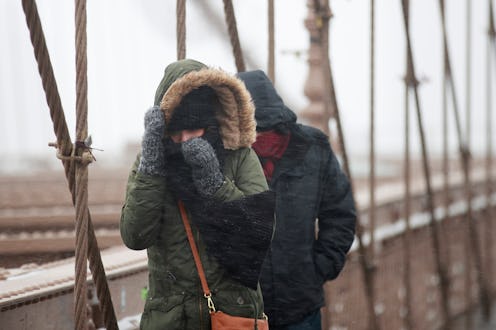News
Some U.S. Cities Are About To Feel Even More Freezing Than Mars

Ah, it's the most wonderful time of the year, when great swaths of the United States dip to below freezing temperatures, and even the mere task of taking out the garbage can numb fingers. Parts of the East Coast and the Midwest are bracing for a severe cold spot to usher in the New Year, and if a recent report is correct, temperatures could be colder than those of Mars in some places.
On Friday, The Washington Post reported that parts of Canada indeed feel colder than Mars. The day before, the temperature on Mars had hit -20 degrees Fahrenheit, while in cities like Edmonton and Yellowknife, it felt like -40 degrees.
Canada's southern neighbor, though, is also predicted to get Mars-like temperatures over the next few days. As CNN reported, low temperatures in Minneapolis could dip to -19 degrees, and feel like minus 25-40 degrees in some spots. Other cities that could feel a bit like the Red Planet include New York, where the high on Saturday night is expected to be 12 degrees, and Boston, where New Year's temperatures are supposed to hover between minus five and five degrees.
Sure, the temperature might not technically dip to a Mars-like minus 20 degrees in all these cities, but the wind chill could certainly make it feel like it.
Despite the Mars-like temperatures, some have had fun while braving the cold. On Thursday, the Mount Washington Observatory in New Hampshire posted a photo of one of its weather observers, Adam Gill, pouring boiling water into minus 31 degree temperatures, and watching it immediately freeze.
Others have had fun documenting the visible effects of the cold, such as the frozen-over fountain in New York's Bryant Park.
There is just one catch to the Mars comparisons, as The Atlantic reported: because the Red Planet's atmosphere is about 100 times thinner than that of Earth, temperatures likely feel much colder on this planet. As NASA scientist Michael Mischna pointed out to the publication,
On Mars, where there’s little water vapor and few air molecules, a person wouldn’t feel as cold. 'Minus 100 degrees on Mars might only feel like minus 30,' he said.
Some people, including the president, have taken these sub-zero temperatures as an encouraging sign that global warming and climate change just aren't a thing.
As The New York Times pointed out, though, Trump's logic is flawed. The concepts of climate and weather are different from one another, so while it might be cold today, that doesn't mean someone should predict what this means for the long-term viability of the planet. This, of course, won't stop the president from playing politics with the issue, as he is wont to do. He did, after all, pull out of the Paris Climate accord with little regard for the research supported by the rest of the international community.
A University of Georgia professor used the same explanation to refute Trump's logic, writing in Forbes that "Even as climate warms, we will always have winter (cold weather, snowstorms, blizzards)." So while it might not feel like the globe is warming in these frigid temperatures, that's not a great excuse to ignore legitimate research that climate change has and will have adverse effects here on Earth.
For years, so-called "space architects" have focused on making planets like Mars habitable for humans. In a 2015 interview with The Guardian, Robert Zubrin, the president of the Mars society, predicted that there would eventually be millions of people living on the Red Planet, even being able to "travel light and live off the land." With some humans already used to the temperatures that are regularly recorded on Mars, people might be even more prepared than scientists thought.